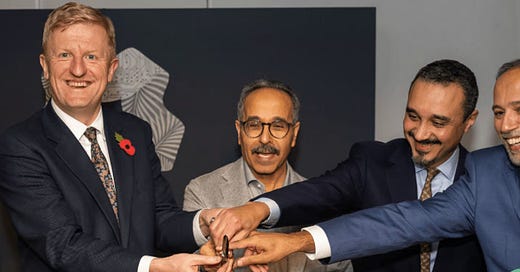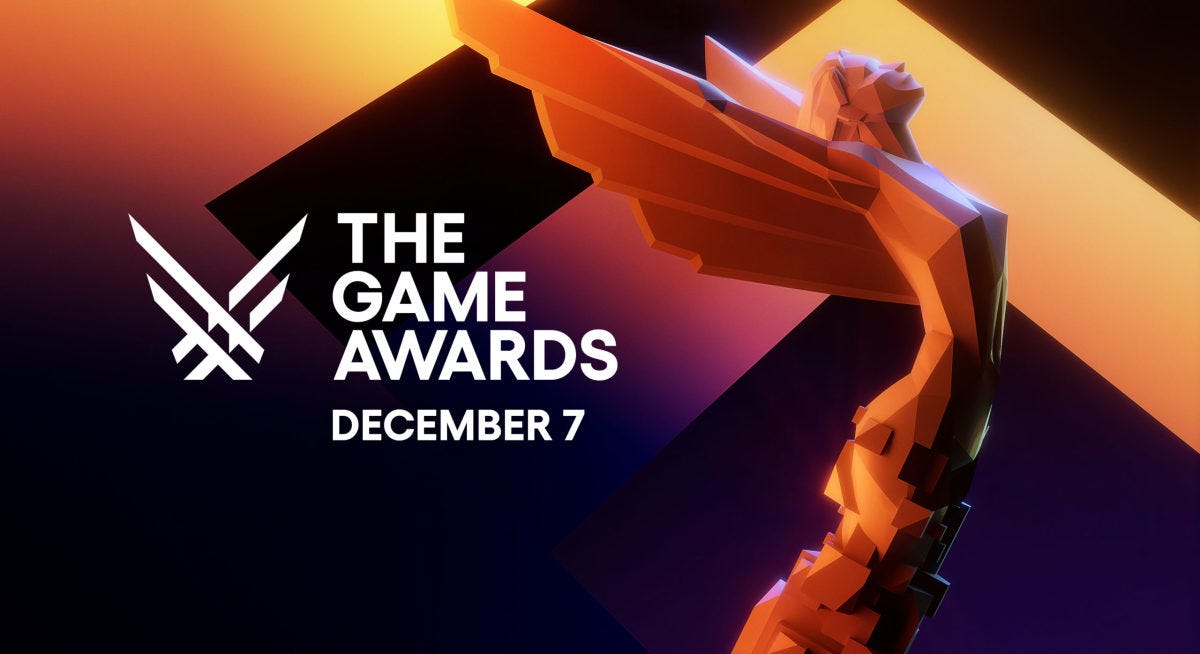Saudi Arabia’s Savvy Games Strategy: Video Games Industry Memo, 16/11/2023
Inside the country’s plan to speed-run the creation of a games cluster
We dive deeply into Saudi Arabia’s video games strategy
Baldur’s Gate 3 and Alan Wake 2 head The Game Awards nominations
Super Mario RPG leads a gradually quietening release slate
Right, it’s a *big* big read this week.
Strap in tight for geopolitical intrigue, one of the quickest modern histories of a nation you’ll ever read and a heck of a lot of links to video game acquisition stories.
VGIM AWAY!
The big read - Saudi Arabia’s Savvy Games Strategy
I’d forgive you if you told me that you didn’t know what Oliver Dowden, the UK’s Deputy Prime Minister, was up to last week.
Rishi Sunak’s decision to remove his controversial Home Secretary Suella Braverman and welcome former PM (and alleged bacon enthusiast) David Cameron back to frontline politics kept all eyes firmly on Number 10.
But last Friday, the Deputy PM popped up in Holborn to give an intriguing UK Government thumbs up to the opening of the first international office of NEOM - Saudi Arabia’s $500bn giga-project to build a futuristic tech powered city on the Red Sea.
The new office aims to build NEOM’s relationship with international investors, partners and other supporters. This includes companies like London based Animoca Brands who, by happy coincidence, recently received $50m of investment from the super city and are now just a short stroll away from its benefactor’s new HQ.
However, NEOM’s investment in Animoca represents the thin end of a very chunky wedge when it comes to Saudi Arabia and video games.
The state’s sovereign wealth fund The Public Investment Fund (PIF) has been making a major play to turn the country into a significant games cluster through its subsidiary Savvy Games Group, as a key part of a national plan to build for an oil free future.
And whether it succeeds or not, its strategy for building a games sector from scratch is so stonkingly ambitious that governments and industry really do need to take a much closer look at it in exactly the way that we will…now.
Good for what oils ya
To understand Saudi Arabia’s interest in games, we need to understand its politics. And to misquote Homer Simpson, oil was the solution to and is now the cause of most of Saudi Arabia’s geopolitical problems.
According to Tim Marshall, whose book The Power of Geography provides a pithy history of the country, the discovery of the viscous liquid in Dammam in 1938 - just six years after Ibn Saud established the modern Kingdom of Saudi Arabia - married the state’s fate to the black stuff flowing out of the ground.
Somewhat unsurprisingly, the discovery of oil helped the House of Saud to become fabulously wealthy. It currently sits on a reported wealth of $1.4 trillion dollars as a result of its controlling stake in oil firm Aramco, providing it with a powerful financial position from which to rule.
And since it accrued its wealth, the royal family has been unafraid to use it to consolidate and entrench its control over the state.
Having initially established its position through a combination of cleverly deployed military force and extensive post-conflict marrying, (Crusader Kings for the win), the House of Saud deepened its hold on power by creating a contract between state and citizens which, in Marshall’s words, ensured “the people would obey, and the oil money would give them a good life.” The emergence of a strong welfare state, which still accounts for roughly 50% of the state’s spend today and aims to trade extra comfort for citizens for an unyieldingly authoritarian theocratic political culture, typifies this domestic bargain.
Importantly, oil also helped the Saudis secure their borders. The country forged an alliance with the United States in the dying days of the Second World War to swap oil for security which has remained, with some notable clunks aside, broadly intact since.
But while oil helped secure the Kingdom’s past, steadily dwindling supplies of the black stuff and global efforts to move to renewable energy means it is no longer a guarantor of its future.
The Saudi state saw its financial reserves drop by $200bn between 2014 and 2020, as the price of oil halved across the world - knocking away a just under a third of the country’s safety net in a little over half a decade.
And with the economic backstop of the regime’s domestic and foreign policy being removed much faster than it liked, the Saudi leadership concluded that it needed a new plan to prepare itself for a post oil future post haste.
2030 Vision
That arrived in April 2016 in the form of Saudi Arabia’s Vision 2030 strategy.
Spearheaded by Muhammed bin Salman, Saudi Arabia’s heir to the throne and Prime Minister, Vision 2030 seeks to achieve three interlinked goals to reduce the country’s dependency on oil: diversify the Saudi economy, modernise the country’s cultural traditions and enhance its global profile.
Since its launch, the strategy has led to a flurry of activity aimed at digging Saudi Arabia out of its oil dependency.
Within the wider economy, the Saudi state has pushed hard towards opening up its technology and services sectors. It has invested in the likes of Tesla and Uber directly, while partnering with Softbank to support the country’s tech growth more generally.
It has also attempted to modernise by beginning to liberalise rights within the country. Women are finally allowed to both work and drive in the country, cinemas have re-opened and the country is reportedly considering the limited sale of alcohol in hotel bars to align it with other nearby nations such as Qatar.
And in an effort to enhance its reputation globally, the PIF has also made major investments in football, golf and tennis in a move that it argues is a soft power play and that others have described as thinly veiled reputational ‘sports-washing’.
But what else rests atop the three pillars of Vision 2030? Which industry happens to have a track record of creating great technologically enabled jobs around the world, that sits at the cutting-edge of modernity and increasingly has the soft power potential to influence the global debate?
The answer is video games. And this is how Saudi Arabia, a historically theocratic state with a penchant for brutally dismembering critics and dissidents, got into the business of creating virtual fun.
Savvy’s planning
Right, so what is the state’s aim with games? Bin Salman stated last year in his capacity as chair of Savvy Games Group (yes, that is the Crown Prince technically running a games company) that Saudi Arabia wants to create a games sector capable of supporting 39,000 jobs, 250 games businesses and roughly $10bn a year of economic output by 2030.
This is hugely ambitious. Saudi Arabia has practically no history as a game development cluster.
While it is hard to find specific figures about the size of Saudi’s games industry prior to Vision 2030, the IMF reports that the digital economy accounted for just 0.6% of the country’s economic output in 2016. This suggests that it wants to grow its sector from practically nothing to the size to the UK video games industry in under a decade.
However, Saudi Arabia has one advantage that other countries don’t when it comes to growing its games sector: an inordinate amount of money.
So it has armed Savvy Games with $38bn via the PIF, staffed it with senior executives from the global games industry, such as former Blizzard exec Brian Ward, and encouraged it to build a games sector in Saudi Arabia from top-to-bottom by aggressively buying up, or buying into, the games business in four key ways.
The first is by financing game development within Saudi Arabia itself. Savvy has its own Triple A business called Steer Studios, headed up by former Ubisoft exec Yannick Theler, which has grown its headcount to nearly 100 since 2021.
But Savvy and the PIF have also made moves to directly bring talent into the country. This is best demonstrated by its success in enticing Artisan Studios, a French RPG developer, to set up a 200 strong development base in Riyadh by both funding its activities and removing administrative barriers to setting up business via a programme called Ignite.
Beyond its borders, Savvy is building a wider network of owned businesses to help plug Saudi companies into the global market.
Its acquisition of mobile game studio Scopely, the makers of Monopoly Go, and Japanese developer SNK has placed two outright commercially valuable companies in Savvy’s portfolio. But each also has specific expertise within key platforms (e.g. mobile) or territories (e.g. Japan), suggesting Savvy is thinking carefully about how to widen both its own reach and for the developers within its ecosystem.
This is also taking place at the top of the industry, with Savvy taking tactical stakes of roughly 5-8% in major international games businesses such as Embracer Group, Take Two, Electronic Arts and Nintendo.
While there is the possibility it may try to nab one of those businesses to secure an eye-catching acquisition (and it has a war chest for a big purchase), holding stakes in these companies delivers significant passive benefits, such as steady financial returns for the group and a direct line for Saudi businesses into the biggest platforms and publishers, that support the cluster building project further.
Finally, and as part of wider efforts to soften the country’s image, Savvy has used a relatively small amount of cash to become the global power broker in esports.
Its purchase of esports tournament organiser ESL and esports platform FaceIt has sparked a dash for control and influence over the entire esports space.
This has led to international tournaments aplenty landing in Riyadh, Activision reportedly engaging in talks with Savvy to reboot the Overwatch League in the territory and the installation of a Saudi prince as the head of the international esports federation.
And while the financial clout of esports may be in question, it usefully dovetails with Saudi Arabia’s wider sports-washing agenda - as evidenced by Cristiano Ronaldo helping to announce the Esports World Cup that’s set to take place in Riyadh in 2024.
In short, Savvy are attempting to speed-run the creation of a video games cluster in the territory by buying in talent to turbo charge its domestic scene, building links to global games powers to open the door to its growing studios and using the cultural power of games to redefine the country’s image.
It is certainly ambitious and consistent with the aims of Vision 2030. But will it actually work?
Arabian right?
My hunch is that in general terms it will. Savvy’s plan is coherent and well considered. Its acquisitions and investments suggest it has avoided the temptation to bet on one big company to instead build a self-sustaining, and less risky, ecosystem. And where it has put its money into riskier ventures like Web3 or esports, it has balanced it with Tencent-like investments into thriving global games businesses to mitigate risk.
This will likely lead to the growth of a Saudi Arabian games industry that is considerably bigger than it is today.
However, the real question is whether Savvy achieves success on the ambitious terms set by the Crown Prince. And I feel those are harder to reach (without some creative cooking of the economic books) for a few key reasons.
First, the timeline for success is short. Seven years isn’t a long time to build a games cluster, especially given the average development cycle of a modern Triple A video game. Leading Saudi Arabian developers will have few opportunities to land major releases before the decade is out, leaving Savvy’s hopes for organic self-sustaining economic growth dependent on a handful of home-made games hitting the mark straight out of the gate.
Second, the timeline issue is compounded by a skills problem. Saudi Arabia has recognised its domestic talent currently lacks the deep skills base needed to drive forward diversification, with the country making wide ranging plans - such as courting global universities to rapidly open up student places within its borders - in an effort to address the issue.
But while steps like these will be valuable in the long term, the country will, like most of the global games industry, be reliant on winning the war for international talent in the short term.
And although the offer of attractive pay will undoubtedly appeal to many seeking work in a tough year, much of the industry’s international talent will bet they can find good roles in modern global metropoles, Scandinavian social democracies or even their own bedrooms without relocating to Riyadh to compromise their values or, in the case of the industry’s thriving LGBTQ+ community, their lives.
Finally, the success of Saudi Arabia’s games sector is subject to political vagaries in a way few others are.
With the Crown Prince on the company’s board, the extent to which bin Salman succeeds with Vision 2030, navigates the risks of social and religious upheaval as a result of liberalisation and stays on top of family politics could prove uniquely important to the sector’s fortunes. It is a problem no other games cluster has to consider so directly and a tough one to plan for.
The path to succeeding on Saudi’s own terms is therefore narrower than it will like. Nevertheless, Saudi Arabia’s current games strategy is a bold, well-funded shot across the bow of both industry and national governments.
And however it plays out, the attempt to blitz the creation of a video games sector in under a decade will likely deliver plenty of lessons for policy makers and industry alike in the years to come.
News in brief
Keighley anticipated: Nominations for this year’s The Game Awards are out, with Baldur’s Gate 3 and Alan Wake 2 leading the charge. Will they win big? Are any of the games nominated for the indie category actually indie? And which developer will realise they’ve spent upwards of six figures to have their 60 second game trailer sandwiched between an ad for Subway and Mountain Dew? Find out next month.
All your games are belong to U.S.: New research from the British Film Institute (BFI) and the Creative Industries Policy and Evidence Centre (PEC) reveals that American companies were responsible for 49% of the 118 international acquisitions of UK games businesses between 1993-2022. Chinese businesses sit second with 15% of transactions, while Sweden is third on 10%.
OLED us entertain you: Valve announced the release date and price for a new OLED Steam Deck just in time for the festive season. Do consider buying one for Christmas for a relative/friend/partner/yourself; don’t call it the Steam Deck 2 for fear of internet shame.
Pop it like it’s Fort: Snoop Dogg and his son have set up a new business called Death Row Games to empower minority creators to make content for the Fortnite ecosystem. The desire to place my face in my hands and rub it in anguish over the name of the company is countered by the fact it’s actually a nice idea for a games business.
PC Lamer: PC Gamer has been criticised for failing to include a single woman in its list of the 30 most influential voices in the PC games sector over the past three decades. Let’s pop down Roberta Williams, Co-Founder of the legendary Sierra Entertainment which originally published the first Half-Life, to show that it really wasn’t that difficult to find just one name…
Ins and outs
Nick Poole has been appointed the new Ukie CEO. He takes up the role in April 2024…Korean mobile games giant Nexon has appointed Junghun Lee as its new CEO, effective from March 2024…Jen Simpkins, Editorial Manager at Media Molecule and formerly Editor of Edge Magazine, is hunting for editorial, games writing or games scouting roles…Alun Lower is looking for his next communications role, having spent the past three years with Epic Games and a decade in industry comms posts... Chris Anka, a concept artist and illustrator, is on the lookout for freelance work.
Events and conferences
The team at Pocket Gamer Connects has kindly given all VGIM readers 20% off tickets to its 10th anniversary conference in London next year.
Use this link (or the one in the event listing below) to save literally loads of pounds on your pass.
Slush, Helsinki - 30th November-1st December
The Game Awards, Los Angeles - 7th December
Pocket Gamer Connects (20% off link), London - 22nd-23rd January 2024
Game Developers Conference, San Francisco - 18th - 22nd March 2024
London Games Festival, London - 9th-25th April 2024
Games of the week
Super Mario RPG: Nintendo buys time for its main studios to make games for the new Switch with the release of a remastered, but well reviewed, RPG.
Warhammer Age of Sigmar: Realms of Ruin: Fall in love with our new Home Secretary’s favourite hobby in this Cambridge developed real time strategy game.
Assassin’s Creed Nexus VR: Give your historical murdering a first person twist in this new Assassin’s Creed VR experience.
Before you go…
The speed running community reached a new high/low this week, after one enterprising player successfully had sex with a man-cum-bear in Baldur’s Gate 3 in 50 minutes and 30 seconds.
You know what they say about beastiality references in VGIM; you wait ages for one to come along and then two arrive at once.
Got a tip for our ins and outs, events and conferences or games to watch sections? Or want to chat about Work Stuff? Drop me an email here.






